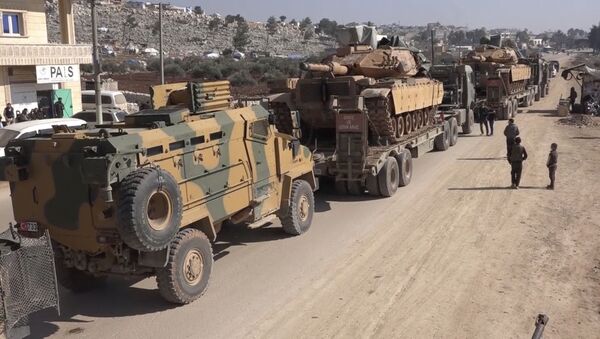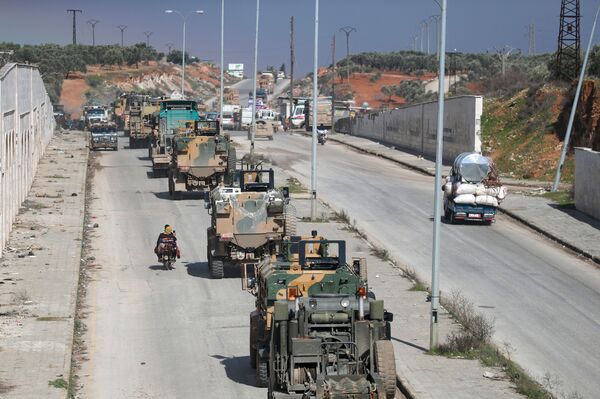On 17 February, Russia and Turkey conducted joint military patrolling in northeastern Syria following a temporary suspension amid clashes between Syrian Arab Army personnel and Turkish troops in Idlib.
Earlier, Washington threw its weight behind Ankara dispatching US Special Representative for Syria Engagement James Jeffrey to the country. Commenting on the situation surrounding the last remaining terror hotbed in Syria, the US ambassador highlighted on 12 February that "the United States totally agrees with Turkey on its legal presence and justification for Turkey defending its existential interests" in Syria.
"We understand and support these legitimate Turkish interests that have Turkish forces in Syria and specifically in Idlib", Jeffrey told NTV, Turkish nationwide television news channel. "We understand that, and we as a NATO ally, are looking into how we can help ensure that Turkey has the information it needs and that our equipment transfers to Turkey which are considerable, are working well".
Why Trump Won't Involve in Military Conflict Over Idlib
One might wonder whether the US is ready to provide further military support to Turkey under Article 5 of the North Atlantic Treaty in case clashes over Idlib between Ankara and Damascus resume.
"It is extremely unlikely that the US will be directly involved militarily in the tensions between Turkey and Syria – simply because this is not the Foreign Policy approach of the Trump administration", opines Dr Bamo Nouri, a lecturer in American foreign policy, political analyst and investigative journalist from the UK.
The scholar explains that previously, US military interventions were justified by a broad set of goals including "the promotion of democracy, peace, national and regional security, stability and also economic interests"; for its part, the Trump administration "operates on much narrower interests when it comes to foreign policy".
"There has to be a clear and obvious economic interest for the US to intervene or a direct threat to national security", he says. "In this particular case, there is neither".
According to Nouri, what Turkey may expect from the US is voicing diplomatic support for Ankara, "which has already happened, at the same time re-iterating the need to de-escalate to prevent a humanitarian crisis".
There's yet another reason why Washington is unlikely to meddle in the Idlib crisis; the scholar points out: "Given that we are in an election year, Trump will be obligated to be careful in foreign policy matters, so as not to involve the US in unwanted and unjustified conflicts around the world", he suggests.
"Scrutinised foreign policy as a result of the legacies left by Obama and Bush, and the priority of economic interests has created a clear reluctance towards military intervention by the Trump administration", Nouri elaborates.
'US Does Provide Turkey With Some Leverage'
Joshua Landis, an American academic and the head of the Centre for Middle East Studies at the University of Oklahoma, echoes Nouri asserting that it is highly unlikely that the US will intervene "directly".
"It seems like the US is divided on this issue because Robert C. O'Brien, the NSA chief said that there is very little the US could do other than to wave a flag", Landis highlights. "But Jeffrey – the special envoy to Syria from the State Department has been in Ankara trying to convince the Turks to take a hard line to keep Iranian and Russian influence from having any success in Syria – any further success, I should say".
According to the academic, it's unclear what the US can do at this point: First, Washington has pulled out most of its troops from the region and is now in trouble with Iraq. Second, there's "arm-wrestling with Turkey over Russian influence in the country – particularly the sale of the S-400's or the integration of the S-400 and aircraft missiles into the Turkish military structure".
"So it's a very difficult time for the US to keep throwing real backing behind Turkish military efforts", Landis presumes, adding that, nevertheless, Washington "does give Turkey some leverage needless to say, against Russia".
Therefore, he continues, Turkey is stepping up its support of the UN-recognised government in Tripoli, Libya and has paid visits to Ukraine. According to Landis, these actions are aimed at "gain[ing] leverage against Russia for the Idlib operation".
Clashes in Idlib Province
On 3 February, eight Turkish troops and a civilian contractor were accidentally killed when the Turks and Syrian government forces exchanged fire in Idlib, hours after a large Turkish military convoy, consisting of dozens of armoured vehicles, entered the last remaining jihadi stronghold in the country.
For quite a while, the Syrian Arab Army (SAA) has been carrying out counter-terrorism operations aimed at eliminating terrorist remnants in the province. On 10 February, Ankara reported that additional five Turkish soldiers were killed during the SAA attack which prompted the Turkish military and the Syrian National Army (SNA) to launch an operation in Idlib. At the same day, the Turks claimed that they had hit 115 Syrian government targets and killed 101 Syrian soldiers.
For his part, Turkish President Erdogan toughened rhetoric against Damascus on 11 February claiming that the Syrian government "would pay a heavy price" for its actions in the province".
Meanwhile, the Russian Ministry of Defence rubbished Ankara's claims about the Syrian Arab Army's losses and denounced the Turkish military's statements as "irresponsible". On Monday, a Russian and a Turkish delegation met in Moscow to work out an agreement on a lasting truce for conflicting parties in Idlib.



